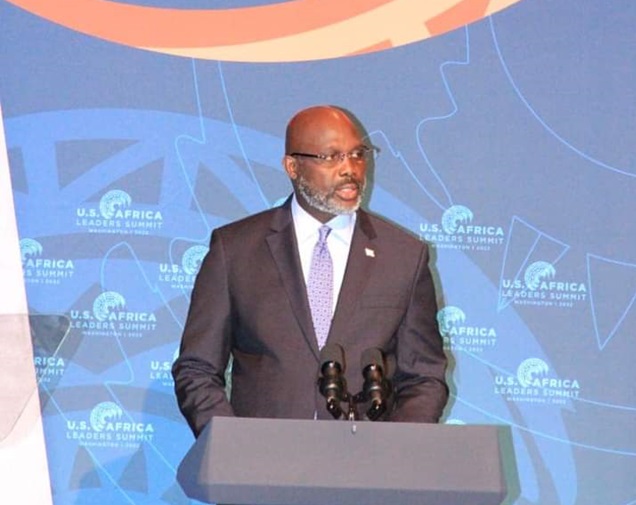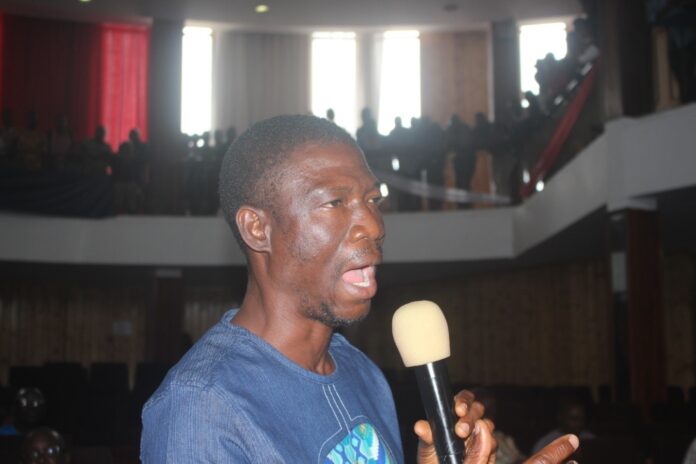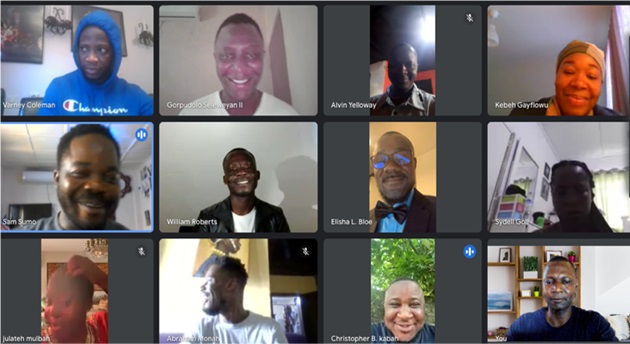Part I of Series On President Weah’s Recent International Tour
An opinion by Arthur T. Y. Douglas, Jr.
President George Manneh Weah is now back home, in the country, (Liberia), after a heavily-loaded international tour. The president returned on Monday, December 19, 2022, to an arousing welcome at the Roberts International Airport in Margibi County after which he attended a thanksgiving service at the Dominion Christian Fellowship Church in Congo Town, thanking God for the safe return of the President and his entourage.
Over the past few weeks, discussions surrounding the international travel of the Liberian President, His Excellency Dr. George M. Weah, dominated the public discourse. These discussions, which were especially heralded by opposition politicians, took over the airwaves, intellectual fora, and even some international wires. In their expositions, politicians were heard criticizing the president’s travel as being unconstitutional, wasteful, and only intended for his personal aggrandizement at the detriment of the Liberian people. In addition to that, they claimed that the president’s absence amid challenging times and the rollout of critical national programs such as the National Housing and Population Census, was equated to ‘not caring about the plights of his people.’
Government information machinery responded effectively debunking and dismissing the claims as false and misleading, sparking a long-running and heated national debate. But amid all this, the million-dollar question that the ordinary Liberians are interested in finding an answer to is whether or not the president’s trip was worth it. You will agree, this is what matters the most because it would determine how the trip benefits or impacts the lives and development of Liberians and Liberia.
In an attempt to help soothe the quest for an answer to the question at hand, this article does not present an upright “Yes” or “No” but would endeavor to drive through an analysis of key issues and facts surrounding the President’s trip which would then make it easier for one to make a determination from his or her own conviction.
We’ll begin by asking critical questions. There are countless of questions that may come to mind, but for the sake of the first part in a series of upcoming articles on this issue, let’s narrow in on three questions that are most necessary for the discourse: What was the essence of the President’s trips? What dividends does Liberia stand to benefit from? And finally, did the expenses or cost of the trip exceed the benefit accrued?
Brief Overview of the President’s Travel
The President’s trip lasted a little over a month and spanned approximately five countries, climaxing with the United States of America. Many of these international engagements were either based on official invitation or an international obligation as a head of state in an effort to join other world leaders among others in addressing pressing global issues.
For instance, President Weah’s travel to the Kingdom of Morocco on October 31, 2022, was on the invitation of the King of the North African nation, His Majesty King Mohamed VI, to participate in the MEDays International Forum convened in Tangier. The forum of which he was the keynote speaker, attracted world leaders among others to discuss critical geopolitical and socio-economic issues affecting Africa and the world at large, including the war in Ukraine, conflicts and instability in Africa, tensions in the Indo-Pacific, food and energy crises, inflation and climate change.
The President’s trip to Sham el-Sheikh, the Arabic Republic of Egypt, for the COP 27 Climate Change Summit, was squarely based on Liberia’s international obligation and commitment as a member of the community of nations. Being the leader of this sovereign nation and Africa’s oldest republic, President Weah had to be actively present to propound the views, aspirations, and contributions of the Liberian people in an effort to address climate change and its related challenges.
From Egypt, the Liberian delegation, headed by President Weah landed in Paris, France. It was in honor of an invitation from the French President, His Excellency, Emmanuel Macron, to the 5th Paris Peace Forum, an annual event aimed at exploring modalities for mitigating conflicts and sustaining world peace. Again, being an internationally acclaimed Peace Ambassador, President Weah had so much to offer to the discourse.
The next destination was the beautiful city of Doha, Qatar, where the President, a legend of the game, was honorably invited to grace the 2022 FIFA World Cup ceremonies by both the State of Qatar and the Federation of International Football Association. Though sports related, the forum was not bereft of the presence of key international figures including 26 heads of state and organizations with the potential of boosting Liberia’s development initiatives.
The President and entourage then traveled to the Principality of Monaco where delivered another insightful keynote address at the 13th Edition of the International Peace and Sport Forum on the invitation of His Serene Highness Prince Albert II. Again, as it relates to peace and sports, particularly promoting sports as a tool for uniting peoples and nations, the Liberian President was found best suited among equals, hence his invitation.
And finally, at the climax of the President’s exhaustive international tour was the United States of America where he participated in the famous and much-talked-about US- Africa Leaders’ Summit in Washington D. C.
What does Liberia stand to benefit from?
It is not common, I stand to be corrected, that there are existing laws on the books that prevent the President of the Republic of Liberia from traveling internationally. It is, therefore, within the president’s purview and description to choose when and where to travel, whether on an invitation or honoring an international commitment. Whatever the case may be, there is always a very high expectation from the citizenry- an expectation of great returns or dividends to the country in the form of support – financial, material, etc- as a direct result of these travels.
As a committed and people-centered leader who is mindful of delivering on his promises of development initiatives and life-transforming programs, President Weah is always cognizant of not only his people’s expectations but also the need to make the most out of his international engagements in the national interest.
Against this backdrop, President Weah reported to the nation on Monday upon his return that the overly criticized recent international engagement will greatly benefit Liberia, particularly in infrastructure development, education, and environment, and positively impact the lives of ordinary Liberians among others.
“Fellow citizens, I can assure you, Fellow citizens, that the visit abroad was a necessary imperative, because it was in the national interest and, as you will see later in these remarks, Liberia accordingly derived substantial benefits from it,“ declared President Weah as he addressed a cross-section of Liberians at the Dominion Christian Fellowship Church in Congo Town. In a nutshell, the recent international travel of the President is expected to attract a whooping amount in the range of over 230 million US Dollars along with 15 international scholarships among others.
Of that amount, 50 million was committed by the Hungarian Government on the sidelines of the MEDays summit in Tangier, the Kingdom of Morocco. In addition to that, the Tangier Med Port Authority committed to providing training and technical support to the National Port Authority, with plans to refurbish and transform the Port of Greenville in Sinoe County. Though the actual value of this commitment was not given in cents and dollars, it is no secret that port developments and capacity building are seriously cost-intensive.
At the COP27 conference in Egypt, President Weah and team secured $10 million United States Dollars for coastal defense barriers for Greenville, Sinoe County, and West Point in Monrovia. Though it was literally a sporting event, President Weah was able to leverage his attendance at the 2022 FIFA World Cup events to attract about 150 million US Dollars – 100 million to fund phase 2 of the Gbarnga – Mendikorma Highway in Lofa County and $50 million to build sporting facilities in Liberia. Meanwhile, at the eagerly awaited US-African Leaders’ Summit, President Weah, and his team, having made the case for Liberia, are expecting around 20 million which would buttress the government’s support to the 2023 general and presidential elections.
Speaking during the thanksgiving service in honor of his return at the Dominion Christian Fellowship church, President Weah noted that Liberia should expect to begin receiving the visits of some international partners in the coming days as a result of his trips abroad.
Cost and Benefit Analysis: Did the cost of the trip exceed the benefit accrued?
Cost and benefit analysis is a critical decision-making tool and determinant for whether or not an endeavor has or will accrue maximum benefits at little or no cost. Applying this to the President’s trip, let’s use the wrong projections that were made by opposition politicians. According to critics, the President and his entourage spent about 1.5 million USD to cover the travel expenses of the recent international tour. Let me quickly mention that this claim was debunked as false and misleading, with the President‘s Office saying the actual amount used was far too low than what is claimed by critics.
However, let’s assume 1.5 million was the cost of the trip. Now, compare it with the staggering 230 million US Dollars that Liberia stands to benefit from the trip. Obviously, 1.5 million is incomparable to 230 million. Holding all things constant, the cost of President Weah’s recent travel to over five countries was infinitesimal to the benefits that Liberia stands to accrue.
Back to the question under discussion here: “Was the President’s travel necessary?” To finally answer the question satisfactorily ask yourself a final question: what if President Weah had canceled or declined to make the just-ended international travel? Would Liberia have anything to benefit from?
Lest we forget, Liberia is a post-war country still thriving on the path to full reconstruction and development. Liberia’s economy is still struggling to recover from the shocks of the ebola and covid19 viruses. And if we must build the Liberia we want, more international support remains a major factor to boost local efforts and speed up national development.








Do we have written commitment to all of these?